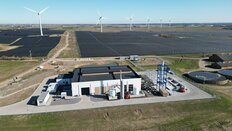- The plant received DKK 81 million (EUR 11 million) from the Danish EUDP.
- Located in Ramme, Denmark, it produces 5,000 tons of green ammonia annually.
- The facility uses 50 MW solar panels and 12 MW Vestas wind turbines.
- Green ammonia helps decarbonize industries like steel and cement production.

Introduction
A significant milestone has been achieved with the inauguration of a green ammonia plant in Ramme, Northwest Jutland, Denmark, by Topsoe, Skovgaard Energy, and Vestas. This plant aims to demonstrate the integration of renewable power with ammonia production, addressing power fluctuations and ensuring cost-effectiveness.
Funding and Location
The project has received DKK 81 million (approximately EUR 11 million) in funding from the Danish Energy Technology Development and Demonstration Program (EUDP). The plant is situated in Ramme, near Lemvig, Northwest Jutland, Denmark.
Production and Technology
The plant will produce 5,000 tons of green ammonia annually, preventing 8,200 tons of CO2 emissions each year. It utilizes 50 MW of new solar panels and 12 MW of existing V80-2.0 MW Vestas wind turbines to power the production process. The dynamic approach of the plant allows it to adapt to fluctuations in power output from renewable sources, optimizing production and cost-effectiveness.
Significance of Green Ammonia
Green ammonia, produced using renewable energy, is expected to play a crucial role in the global journey towards net zero. It can be transported using existing infrastructure and has multiple end-uses, including as a fuel, hydrogen carrier, and in decarbonizing industrial processes like steel and cement production.

